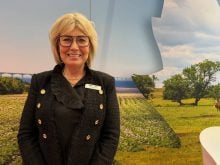HAFFORD, Sask. – Valerie Kingsmill knows what it means to be an entrepreneur.
“I think someone who sees an opportunity and isn’t afraid to take those steps and goes and does it, is an entrepreneur,” she said.
For the past eight seasons, Kingsmill has owned Emmett’s Cottage Inn and the Dory Dining Room in Hafford.
But becoming the “chief cook and bottle washer” has not been an easy task.
She said finding enough money was the biggest challenge when she started her first business, Emmett’s Tearoom, more than 10 years ago in Ruddell, Sask.
Read Also

Manitoba grain elevator ownership expands
Carman-based Linear Grain buys Fannystelle elevator from Bunge, another three elevators sold to Morden’s BP & Sons Grain and Storage Inc.
“One outfit wanted my soul and first child, so getting funds was relatively difficult,” she said.
“I think a lot of it had to do with being a woman and the fact (people) thought there’s no way you’re going to make this work.”
The business was also started out of necessity when her husband’s band wasn’t getting many bookings. After trying various jobs, Kingsmill thought being on her own would be better.
“I decided to start my own business because that way I can’t get fired.”
Kingsmill persisted and her tearoom in Ruddell became well known. It was featured in the Where to Eat in Canada guide for nine years.
When the family left Ruddell and moved to Hafford, Kingsmill decided to attempt a repeat performance, this time adding a bed and breakfast, with three rooms, and a licensed dining area.
The rooms are usually filled with work crews, sales people and tourists from as far away as Germany.
Kingsmill said locating her business in a small town adds to the ambience.
“What I wanted to do in the rural town, as far as the dining room is concerned, was to give people a nice place to eat that wasn’t a local cafŽ. And without having to travel all the way to Saskatoon.”
She deems herself successful by the many thank-you cards displayed along the hallway.
“I have the freedom to do what I want. Sometimes it would be very nice to be paid, but I like to do my own thing, creating my own meals or doing my own garden.”
Jacqueline Pohl can also relate to .the need for freedom from a traditional workplace.
For the past three years, Pohl has operated a quilting business called the Vintage Quiltery out of her Gladstone, Man., home.
Customers send Pohl their quilt pieces and she finishes them on special equipment in her workshop. She said being on her own has been refreshing.
“I can work the hours that I like, which does not say you work less hours, you work very many more. But you get to choose when you do them.”
No promotion problems
Pohl faced many of the same challenges as Kingsmill when starting her business. But because she deals with a select market, her location hasn’t made it difficult to find customers.
“In this situation, where people actually want your services, they will come to you, which is very nice.”
She said setting up her shop in a small town has reduced expenses.
“There is always the aspect of the business taxes and such, which is much less in rural areas. You don’t have the overhead.”
Both women belong to their respective provincial women’s entrepreneur associations, which provide information, networking, counseling and business loans.
Patti Sullivan is executive director of the Women’s Enterprise Centre of Manitoba. She said rural entrepreneurs can sometimes feel cut off from business contacts, although the internet has reduced this considerably.
“Women in a smaller community are worried very often about confidentiality,” she said.
“So, say I want to start a business but I know my competitor is down the street and she’s actually my neighbor, so who do I talk to about that business and get information on how to start that business?”
Sullivan’s centre avoids confidentiality problems by offering business links from other provinces.
Laura Small, executive director for Women Entrepreneurs of Saskat-chewan, said securing money from banks can be difficult for rural women.
“The types of businesses that women tend to start in rural areas, there’s not a lot of assets there,” she said.
“And that is what traditional financial institutions lend on, is assets with collateral to cover their loan. Quite often women in rural areas will start a service-based industry or a business with limited assets, so then there is a limited ability to access financing.”
Small said an increased awareness of women in business is making it easier for them to find financing.
“But I still think we have a ways to go.”
She said financing, credibility and stereotypes are the main stumbling blocks for rural women entrepreneurs.
Kingsmill has experienced all three, but continues to do what she loves. She said after all these years, people still ask her if they can speak to the boss and won’t believe her when she tells them she’s it.
Both women said becoming an entrepreneur takes a lot of hard work and shouldn’t be entered into lightly.
“You have to be extremely stubborn, dedicated and determined,” Pohl said.
“And willing to put in many more hours than what you would as an employee for someone else. But, you meet an amazing assortment of people and you get to create, you get to do what you love.”
For more information about starting a business, contact Women Entrepreneurs of Saskatchewan at 306-477-7173, Women’s Enterprise Centre of Manitoba at 204-988-1860, and Alberta Women’s Enterprise Initiative Association at 403-777-4250.














